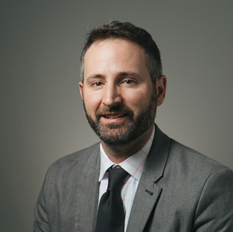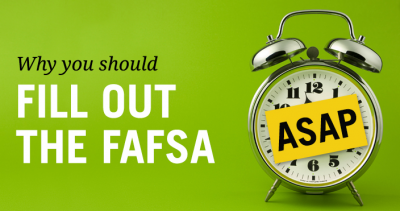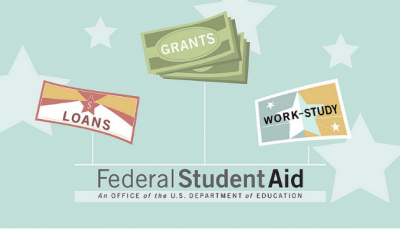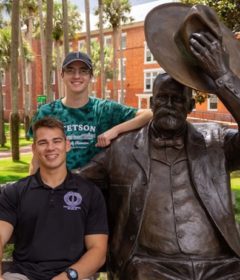Interested in Financial Aid?


Financial aid expert Ray Nault says he often hears a common misconception about student financial aid.
Some students assume their parents earn too much money for them to receive assistance. So, these students never fill out a Free Application for Federal Student Aid (FAFSA) each year.

“We are really trying to encourage students to complete their FAFSA,” said Nault, interim director of Stetson’s Office of Student Financial Planning. “While they may think they are not eligible for aid, they may be. Their income determines what type of aid they may qualify for – not whether or not we’re going to give them something.”
Filling out the FAFSA is the first step for students to find out how much they can receive in federal and state aid. The office of Federal Student Aid provides more than $120 billion a year in grants, work-study and loans, according to its website.

The FAFSA application process for the 2020-21 academic year opened Oct. 1, with priority deadlines on Jan. 15 and March 1.
Some awards are made on a first-come, first-serve basis. That means students should complete their FAFSA no later than March 1 or the financial aid may be gone, Nault said.
Other tips that might help Stetson students:
- Stetson is the only university in Florida that has partnered with Scholarship Universe, an easy-to-use, personalized, one-stop source to find and apply for outside scholarships. Once students sign up, they can start matching to outside scholarships and may qualify right away. This tool can be found in the MyStetson portal, under “My Financial Plan” in the “One Stop” tab. For further instructions, see the Stetson Scholarship Universe Quick Guide.

- Stetson has started a pilot program that offers continuing students access to RaiseMe, allowing them to earn up to $1,500 to defray expenses by completing certain activities, such as attending a financial literacy program on campus or maintaining a certain GPA. “It’s an opportunity for students who have a gap between their contribution and their award where they can, if they do certain activities, earn money that covers a portion of their bill,” Nault said.
- Stetson also will start a pilot program in Fall 2020 that allows students to receive up to $10,000 to help defray borrowing for their education. In return, they enter an Income Share Agreement with Stetson and commit to pay a portion of their income to the university after graduation (although they are exempt if they earn less than $40,000 a year). The program will “increase philanthropy and, as students repay, that creates an actual revolving fund that allows us to help other students out,” Nault said. The Stetson Board of Trustees approved the pilot program last fall and allocated up to $100,000 in funding for the first year.
- Beginning in Fall 2020, Stetson also will start another pilot program to provide more need-based aid to first-year students of color and low-income students.
With these programs and others, the financial aid office hopes to have more flexibility to assist students. And the office wants to provide that assistance more quickly, especially when a student’s financial circumstances change suddenly, such as a parent loses their job.
Students and their parents can call the financial aid office for more information. Students also can stop by, swipe their Stetson ID and see which financial aid counselors are available that day to assist them. And the website for the Office of Student Financial Planning offers tools and resources for students and their parents.

“One thing that I think people don’t realize is that financial aid is probably one of the greatest untapped resources on college campuses,” Nault said.
For instance, he encourages students to work on campus to earn extra money – either through federal work study, which is a need-based program, or through Stetson’s student employment office, which is available to all students, regardless of financial need.
“I was a work study student in a financial aid office and just never left,” said Nault, who also owns a financial aid consulting business with 18 employees. “Over the past 22 years, it allowed me to grow into a different type of individual who’s still supporting students. Work study has such power and utility that I would really love to see students take advantage of it more.”



